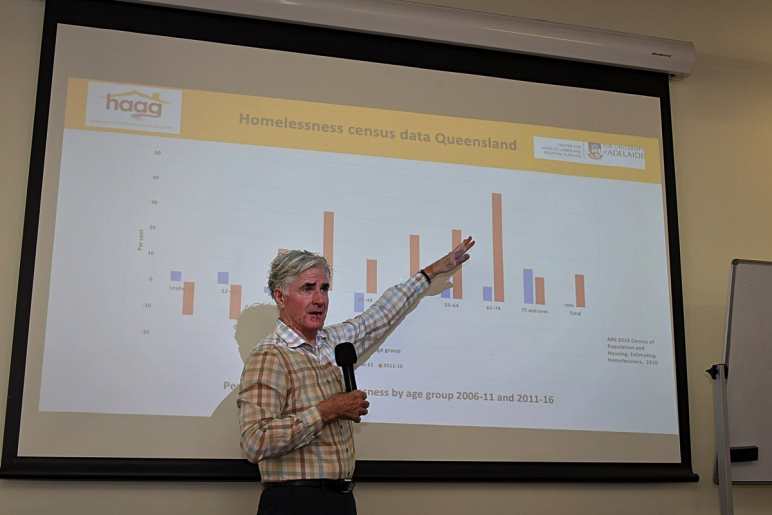‘I Just want secure, safe housing’ – Older renters living on the edge in Queensland
The national Ageing on the Edge Older Persons Homelessness Prevention Project is soon to release its report on the housing crisis facing a growing number of older people in Queensland.
The Ageing on the Edge Project is a partnership between Dr Debbie Faulkner from the University of Adelaide and Jeff Fiedler from the Housing for the Aged Action Group and funded by The Wicking Trust.
Produced in consultation with key agencies such as Council on the Ageing Queensland and Queensland Shelter, the report highlights the rapidly growing problems facing many older people in Queensland. The report also identifies solutions to address the vital housing and service responses needed to help older people in Queensland who are struggling in poverty, hardship and at constant risk of homelessness.
This research has found that there are many older renters struggling to the extent that they are doing without the daily essentials of life such as food, heating, medications and aged care services to ensure they keep a roof over their head. They are a hidden group that are putting up with enormous hardship while constantly under the stress. As one older woman interviewed said ‘It’s the fear of what if (I lose my housing)?’ Older women who have experienced gender disadvantage due to discrimination and lower levels of savings are particularly impacted.
Some of the key points from the report are:
• There has been a a 43% increase in homelessness for people aged 65 and over in Queensland between 2011-2016 censuses, the biggest jump in homelessness of any age group
• Trends in homelessness for older women is even worse with a 56% increase
• Almost 22,000 Queenslanders aged 65 and over are in housing stress paying more than 30% of their income in rent in housing that is insecure, unaffordable and not adaptable as they age
• This represents a massive 43% increase between 2011-2016
• 11,700, 36% of the total, are in extreme housing stress paying more than 50% of their income in rent and doing without essentials such as food, medications, heating and cooling
• 42% of those in extreme housing stress are aged 75 or over and particularly vulnerable
What are the solutions? Among 11 report recommendations two key actions are needed:
• Significant increases in social housing to adequately respond to an ageing population. This must include a program to succeed the National Rental Affordability Scheme (NRAS) that is soon to expire and may cause mass evictions of vulnerable tenants, including many older people
• Develop for the first time in Queensland, specialist older people’s services to help them navigate their way out of homelessness and housing poverty
We strongly encourage the Queensland government to incorporate the key recommendations from this report in their current Housing Strategy and urgently implement them. The Federal Government must also support the Queensland Government in these initiatives as it has a central role in the funding and provision of affordable housing and responses to homelessness.



 "There is nothing like staying at home for real comfort."
"There is nothing like staying at home for real comfort."